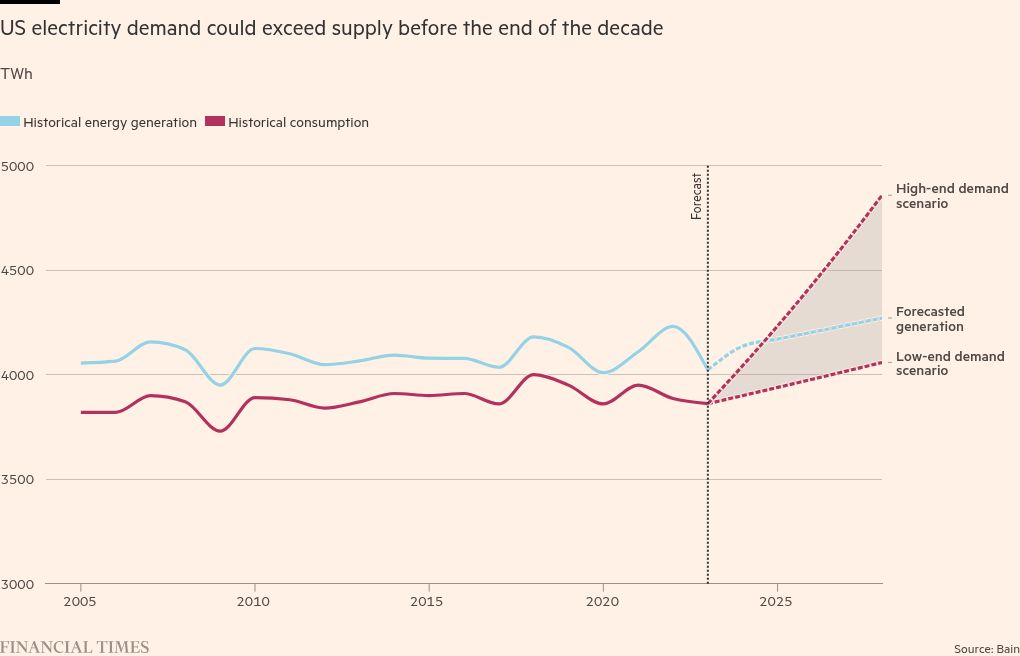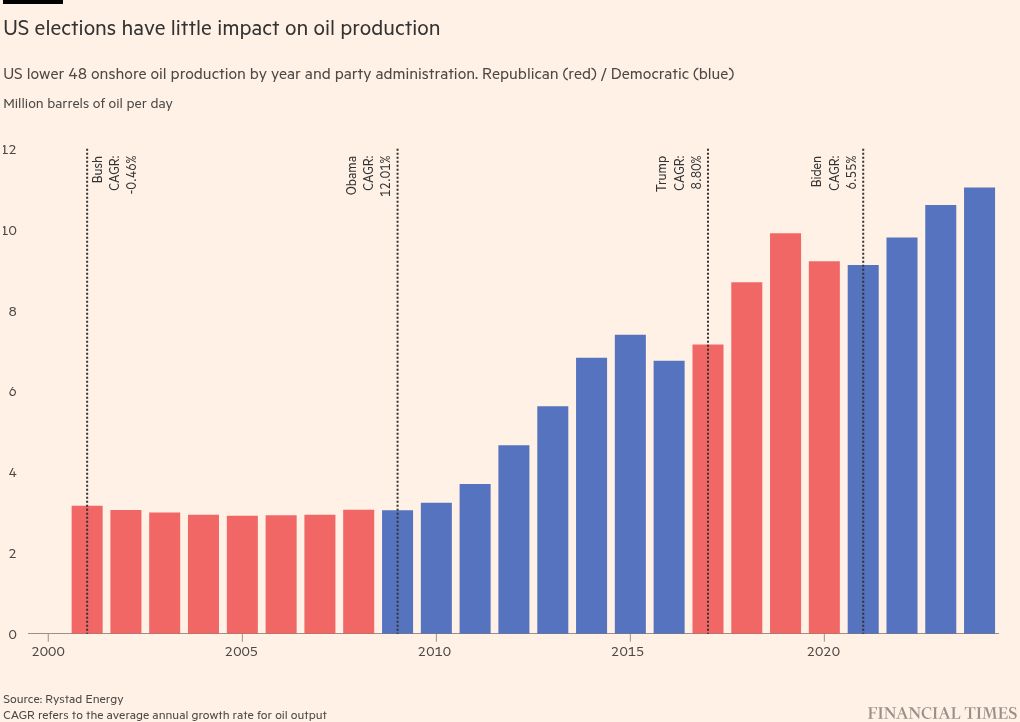
This article is an on-site version of our Energy Source newsletter. Premium subscribers can sign up here to get the newsletter delivered every Tuesday and Thursday. Standard subscribers can upgrade to Premium here, or explore all FT newsletters
Good morning, and welcome back to Energy Source, coming to you from New York.
Hurricane Milton made landfall on the west coast of Florida overnight, marking the second major hurricane to hit the US in a fortnight. The storm arrives as the south-east is still reeling from Hurricane Helene, which killed more than 225 people and destroyed parts of Appalachia.
Oil prices dipped lower yesterday as worries over weak demand from China outweighed fears of an Israeli retaliation on Iran’s oil infrastructure. Prices for Brent crude, the international benchmark, closed at $76.58 a barrel, and West Texas Intermediate, the US marker, closed at $73.24 a barrel, the lowest closing price in a week.
The FT has a new investigation into Russia’s “shadow fleet” of oil tankers out this morning and how state-owned Lukoil was able to fund its acquisition of vessels while hiding its involvement from public view.
Today’s Energy Source looks at a new report from Bain projecting shortfalls in electricity supply from the proliferation of data centres, the backbone of our internet economy and artificial intelligence.
Thanks for reading,
Amanda
Join 300+ CEOs, politicians and investors at the Energy Transition Summit on 22-24 October in London or online. Discover how to navigate geopolitical challenges, boost energy security and capitalise on the green economy. As a premium FT subscriber, you can save 15% off your in-person pass here or register for a free digital pass here.

Surging US power demand driven by data centres set to exceed supply, says Bain
Unprecedented power demand driven by the boom in US data centres will outstrip supply later this decade, Bain warns.
By 2028, the consultancy expects utilities will need to boost annual generation as much as 26 per cent from 2023 levels in order to meet surging power demand — far higher than any supply increase the US grid has achieved in the past two decades.
“This is a real and emergent problem,” said Aaron Denman, head of Bain’s Americas utilities and renewables practice, warning that the shortfall will “put upward pressure [on] rates that will likely exceed inflation”.
US utilities will need an additional $900bn in revenue to invest in new generation sources, leading to a 1 per cent annual increase in customer bills by 2032, Bain estimates in a new report.

The report marks the latest warning from energy consultants and researchers that rising power demand driven by the proliferation of data centres for artificial intelligence, the onshoring of manufacturing and the move to electrification will raise prices for ratepayers and risk slowing the energy transition.
An ICF report last month expects US power demand to grow an average of 9 per cent by 2028, leading wholesale power prices to rise as much as 19 per cent. BloombergNEF recently lowered its projections for US emissions reductions, forecasting a slow transition driven in part by surging power consumption.
A recent power auction from PJM Interconnection, which includes Virginia’s Loudon County, the data centre capital of the world, resulted in prices nearly 10 times the level set at its last auction two years ago because of tight supply.
“It’s like building a new highway in a highly congested area,” said Christopher Kalnin, chief executive of gas producer BKV, referring to the new supply and transmission lines needed to accommodate the load growth from data centres. “It’s incredibly expensive.”
The load growth arrives after power demand has remained virtually flat in the US for two decades. Bain expects data centres to make up 44 per cent of all demand growth through 2028 as companies rush to develop the next generation of AI.
Among its solutions, Bain recommends utilities rethink traditional rate structures that place an undue burden on residents to pay for the upgrades to host data centres. “We think that’s untenable,” Denman said.
Data Drill
Whether Donald Trump or Kamala Harris wins the White House in November will do little to change the plans of US oil drillers.
Former president Trump has made fossil fuels central to his campaign, vowing to “drill, baby, drill” and undo the regulations imposed by the Biden administration. Harris meanwhile has touted the record US oil production during her time as vice-president and emphasised she would not ban fracking, a reversal from her position in 2019.
Neither candidate’s platform, however, will reverse the trajectory of US shale, says Rystad Energy in a new analysis, as the industry continues to prioritise shareholder returns and acquisitions for growth, a form of capital discipline that started as early as the Obama administration.
US shale production will grow a steady 2.21 per cent annually from 2025 to 2028, regardless of which candidate is president, according to the research firm.
“At the end of the day, the industry is driven by market fundamentals, not by politics,” said Matthew Bernstein, senior upstream research analyst at Rystad Energy.

Job moves
-
Emma Pinchbeck, head of trade body Energy UK, is taking over the Climate Change Committee in November, as the government’s climate policy watchdog prepares to set new limits on greenhouse gas emissions.
-
John Kerry, former US secretary of state and climate envoy, has joined Galvanize Climate Solutions as co-executive chair.
-
Melissa Lott has left Columbia University after five years, where she worked as a professor at the Climate School and as a director at the Center on Global Energy Policy.
-
Anjali Acharya is joining The Nature Conservancy as managing director in India after more than two decades at the World Bank.
-
Verde Clean Fuels has appointed George Burdette as chief financial officer. Burdette most recently served as CFO of Arbor Renewable Gas.
Power Points
-
Who, and what, is driving oil prices?
-
More than 100 chief executives, including the bosses of Ikea, Volvo and AstraZeneca, are pushing governments to improve the business case for green investment.
-
India is overhauling regulations to boost its oil production as it races to extract as much crude as possible while a market remains, says its oil and gas minister.
Energy Source is written and edited by Jamie Smyth, Myles McCormick, Amanda Chu, Tom Wilson and Malcolm Moore, with support from the FT’s global team of reporters. Reach us at [email protected] and follow us on X at @FTEnergy. Catch up on past editions of the newsletter here.
Recommended newsletters for you
Moral Money — Our unmissable newsletter on socially responsible business, sustainable finance and more. Sign up here
The Climate Graphic: Explained — Understanding the most important climate data of the week. Sign up here